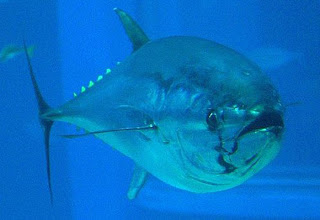

Over the past 40 years, bluefin tuna populations worldwide are estimated to have dropped by an alarming 72% in the Eastern Atlantic and 82% in the Western Atlantic. (Source of statistic: www.wildlifeextra.com/go/news/bluefin-tuna938.html#cr) For an animal that has the ability to lay millions of eggs, that is a very concerning statistic. Unlike sharks and rays, bluefin tuna mature rather quickly and can live to be over 50 years old. The problem is even with this high reproductive rate, more tuna are being taken out of the ocean than are surviving to adulthood.
As adults, the greatest threat that bluefin tunas face is man, but when they are younger, there is a vast array of fish and other animals that love to make baby bluefin tuna a meal. Bluefin tuna are known to spawn in very large numbers, which is when they are often captured by commercial fisherman. One of the places in the world where the bluefin tuna is being highly exploited is in the Mediterranean Sea. During spawning season, the tuna are spotted using aircraft. From there boats move in and net entire schools of bluefin tuna. This practice of course not only takes a good sized number of fish out of the sea at once, but it also takes the lives of countless baby bluefin tuna that would have otherwise been able to take the place of the adults if they were allowed to be born. This style of fishing for tuna is by no means sustainable, but it is mostly isolated to the Mediterranean Sea. Closer to home, bluefin tuna face another threat.
Long line fishing is a massive threat to bluefin tuna. Of course long line fishing is an incredibly dangerous style of fishing that claims the lives of countless turtles, sea birds, sharks, seals, small whales, manta rays, and any other animal that bites a hook. For the fisherman though, this style of fishing allows them to potentially catch a large number of tuna and hence, make a large sum. The problem is that they don't only catch tuna. So what is driving these animals towards extinction?
In a word. Humans. In more than one word... Bluefin tuna have long been regarded as one of the best sushi items in Japan. In fact, roughly 80% of the tuna caught in the Atlantic Ocean is shipped to and consumed in Japan. The amount of tuna that people are selling is simply too much. Humans are putting way too much pressure on these animals and leaving them with very little hope for the future. At the heart of the bluefin tuna industry though is the all mighty dollar. Bluefin tuna sells for a pretty high price as it's meat is very valuable. In fact, a tuna sold in Japan for 1.6 million dollars (US). There are bluefin tuna farms, but there is even an issue with this. The tuna do not do all that well in these farms and they are repopulate using fish from the wild.
As you can hopefully see, the pressure these animals are facing is simply overwhelming. For an animal that spawns in just two places in the entire world, there cannot be such a wide unregulated trade. Being a highly migratory species, these animals will enter and leave the waters of many countries. In some they are protected, in others they are exploited. Welcome to the plight of the bluefin tuna. This summer, the hunt for bluefin tuna will once again kickoff in the Mediterranean Sea where tuna populations will once again take a sharp decline. Stay tuned to Operation Forgotten as the summer progresses for more blogs focused on the majestic bluefin tuna.


